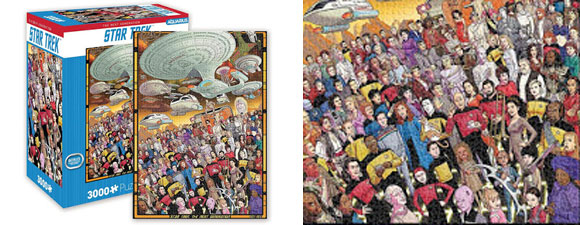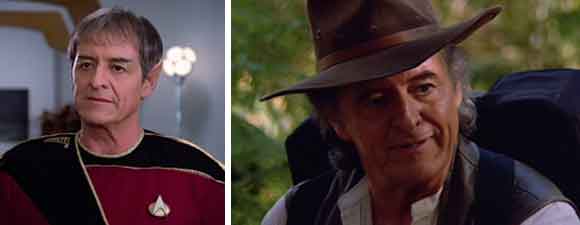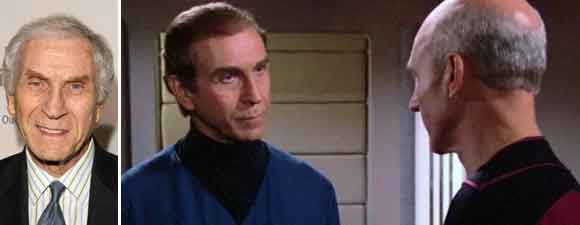Retro Review: Inheritance
8 min readData meets a woman who claims to have been Dr. Soong’s wife and co-worker, and therefore Data’s “mother.”
Plot Summary: When the Enterprise visits Atrea to try to stop the planet’s core from solidifying and making life there impossible, the husband-and-wife team of Pran and Juliana Tainer come aboard the Enterprise to share their scientific expertise. Pran is Atrean, but Juliana is human, and after Data proposes using plasma to liquefy the core, she tells Data that she was once married to Noonien Soong and helped to create him. Data doesn’t remember her because they erased his memory shortly before the Crystalline Entity attacked Omicron Theta and forced them to flee. Juliana had not heard that Soong was dead, and when Data tells her so, she asks to get to know him, saying that she is for all practical purposes his mother. Data tells LaForge that he must verify her story, since he understands neither why Soong never mentioned her nor why she did not contact him previously, but his initial investigation reveals that Juliana traveled with Soong and there is no logical reason for her to have lied about the rest. While Data and Juliana work together on aligning the phasers to inject the plasma into a magma pocket, Data hears stories of his awkward childhood, though he is also surprised at how quickly Juliana can make calculations. Later, in his quarters, he plays the violin for her and shows her a painting of Lal, her “granddaughter.” Juliana becomes upset and confesses that she didn’t want Soong to create Data because of the flaws in Lore and previous prototypes. She was very attached to Data and insisted that Soong leave him deactivated on Omicron Theta in case Data turned out as amoral as Lore, because she did not believe that she could bear to dismantle him. The two play a duet together for the crew, but afterward, Data asks Crusher to look into Juliana’s medical records. Pran is injured when a magma pocket collapses and Data beams down with Juliana to save the project, but a cave-in makes it necessary for them to jump off an enormous cliff to beam back to the Enterprise. Data insists that Juliana will survive the jump, and indeed, when they land, she is mostly intact, but her arm has come off…revealing that she is an android like Data. LaForge finds a holographic chip stored inside Juliana’s cybernetic brain which Data plays on the holodeck; it contains a program designed by Dr. Soong in which the scientist tells Data that he created the android after the human Juliana was fatally wounded by the Crystalline Entity. She has no idea that she is an android and Soong begs Data not to tell her the truth. Crusher believes that Juliana should be told by her “son,” but Troi tells Data that it may be devastating for her to learn that she is not human. Data chooses to tell Juliana only that she was the great love of Soong’s life, and she asks him to visit her when he next can take leave.
Analysis: I love everything about “Inheritance” except its ending. In the still-patriarchal universe of Star Trek, where we’ve heard about Data’s father issues, Worf’s father issues, Riker’s father issues, Spock’s father issues, et al out the wazoo, what a wonderful idea to give Data a mother! And what inspired casting to give the role to the always-wonderful Fionnula Flanagan, whom I’ve been enjoying most recently as the matriarch on Brotherhood – a show she singlehandedly saves from being obsessed with the male power structure of politics and the Mob. She’s terrific here, and Juliana Tainer is a terrific character – apparently she’s the brains in the partnership with Pran, yet she’s neither a crazy-obsessed genius like Serova nor a pretty support system for a brilliant man like Kareen Brianon. She’s comfortable expressing a wide range of emotions and admitting her personal failings, not only to Data but to LaForge; she can be flirty, determined, tearful, maternal, steely, passionate, a more complete character in the few minutes we get to know her than many women of Juliana’s age are permitted to be in entire seasons of other television shows. This is a strong, self-aware woman who can face up to the awful thing she did many years ago, leaving her own “child” deactivated on a devastated planet because she feared what he might grow up to become. She walked out on her husband and scientific partner when she felt she deserved more love than he was willing to give her. As she has demonstrated, she is capable of finding her own happiness. She doesn’t need protection.
So what the heck is Troi thinking, telling Data that she doesn’t think Juliana should be told the truth about who and what she is? And what the heck is Picard thinking, allowing it to be Data’s decision? Let’s forget for a moment how outrageously condescending this is to Juliana Tainer – that most of the Enterprise command crew is willing to accept the word of the husband she left because he didn’t understand her, to agree that if he thinks she shouldn’t be told, that should override common sense. Data and Juliana have already had extensive discussions about how she feels about biological versus artificial life forms – he asked her point-blank whether she would have treated him differently had he been a child of her flesh. And while Juliana admitted that the mechanics are different, she also said that that had nothing to do with her feelings about Data or any of the other androids she and Soong created. She considered them real and complete people. Soong may be remembering a Juliana still scarred by the decision to leave Data on Omicron Theta, who may have been trying to rationalize aloud her ability to do that and to dismantle Lore, but even he must have known that she considered androids to be the equals of humans. It’s Picard’s job to seek out new life forms – well, that’s what’s lying in his sickbay, the most advanced android ever created by humans. How can he decide that Data’s acceptance of Soong’s interpretation of Juliana’s emotional state should be the overriding factor in deciding whether to tell her this fact?
There is so much that’s wrong with this consensus and particularly with the means by which it is reached. As Crusher points out, it’s quite possible that another accident or mechanical failure will reveal at a later date that Juliana is not what she appears to be. Crusher is thinking primarily that she’d rather hear the truth from her own son than from a stranger, but there are bigger problems than who’s going to break the news. If Pran doesn’t know, if nobody on Atrea knows, then if Juliana were involved in an accident that revealed her secret, she might end up torn limb from limb by people terrified to discover that what they thought was a human woman is in fact a machine. Even in a best-case scenario, if Pran knows about Juliana’s past with Soong and guesses what Soong did to keep his love alive, if Pran not only manages to protect Juliana from people who want to examine her but figures out how to fix her and reactivate her, odds are good that he’ll tell her what he has discovered for her own safety, in case she becomes disabled and he isn’t there to explain her to whatever doctors or engineers are summoned. And what’s Pran going to do if Juliana gets deactivated – call Data and LaForge halfway across the galaxy to come fix her? She’s living on a planet that, while no longer destroying itself from the inside out, is probably going to continue to have some seismic events as the newly molten core settles. She could be caught in another cave-in. Or she might decide to go parasailing, or sky-diving, or spelunking – she clearly hasn’t lived her life playing it safe.
Perhaps Juliana would take the knowledge that she’s an android as proof of Soong’s love, since he couldn’t bear to let her go; she might actually feel happy to learn the truth. Maybe she already suspects – she’s very intelligent and has worked with so many androids before, maybe she guesses that her blinking eyes follow a pattern and that her viola-playing is a bit too perfect even without practice – maybe she’s terrified that she’s going crazy, because her medical scans tell her one thing while her personal observations tell her another. If Data doesn’t tell her, and she ultimately discovers it herself, she’ll have to deal with the fact that not only her crazy husband but her android son didn’t think she should be entrusted with the truth. But, again, there are bigger issues than Juliana’s happiness. Maybe she is the breakthrough that will allow the production and acceptance of androids as fully human, so that no one will ever look at Data again like they’re thinking of taking him apart. Maybe an examination of her components would allow him to create a Lal whose neural net wouldn’t suffer from cataclysmic failure. She might have been not only Data’s mother, but “mother” to a new race of androids. She seemed so awed at the thought of having a granddaughter, even a cybernetic one…maybe in trying to protect her, the crew is not only denying her the happiness of future descendants, but denying the universe of androids like her, with a full range of emotions and the ability to seem completely human to anyone who isn’t looking very, very closely.
Sure, there are issues with creating a race of androids virtually indistinguishable from humans – I’ve seen Blade Runner – but that’s not what’s being discussed here. The choice keeps being put as Juliana’s happiness vs. hard cold truth, and just about everyone seems to agree that she’d think ignorance is bliss. But Starfleet is about finding truths – sometimes unpleasant truths like the risks of warp travel, sometimes horrifying truths like the intransigence of prejudice – confronting them, learning from them, making the universe a better place because they can be faced. If Juliana could look in the eyes of a child while deactivating him, then go on to help Soong try to build a better one, she doesn’t strike me as someone who’d ever choose ignorance – not for her own happiness, and not when the future of cybernetics may rest in her mind and her body. I’ll let Data off the hook, reluctantly, because maybe he truly believes he would be better off if he didn’t know that he wasn’t human, but what’s Picard’s excuse for not getting to know the person in question before leaving such a monumental decision up to her nearest of kin?






